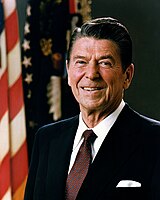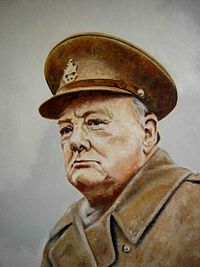The state of TIAH
February 26th, 2007
Digg this
Alternate Historian's Note: We're going to have something a little different today, because I was inspired by a combination of last night's Battlestar Galactica and my daughter's ongoing attempts to kill me through sleep deprivation. The essay I'm writing for you today will be spoiler-ish, so if you don't like spoilers – grow up. I can practically recite the original Star Treks from memory, but they're still great to watch. Getting a vague idea that something is going to break a certain way does not replace the actual wonderful experience of watching a well-made show like Galactica, nor does it “ruin” it, like so many people pretend it does. But, in case you're one of those crybabies who thinks it does, here's your warning. Go watch the episode, then come back and read the essay. Our Guest Historian's work – actual alternate history – will then follow my essay. And speaking of Stephen Payne, he had a great suggestion – we haven't had a good contest in a while, so we're going to have an April Fool's Day Contest! Email us up to 3 entries for an alternate April 1st and we will post the best 10, with your own credit and link to your website (if you have one). We'll also see if we have enough credit for an ultimate winner to get a complimentary TIAH mug, but we can't promise anything on that yet. Get researching those alternate histories now, folks! The deadline will be March 29th.
Battlestar Galactica and the argument for unquestioned military authority - I'm going to step out of the Alternate Historian persona here for today and let my political side come out for just one essay. If you've been reading me for any length of time, you know I'm a left-wing loony, anyway, so this should come as no shock. Last night's Battlestar Galactica - (SciFi Channel on Sunday 2/25/07 at 10PM EST) – concerned a labor dispute and the possibly temporary solution to it reached by the laborers, the colonial president, and the admiral. The episode is very thought-provoking, especially in terms of the Baltar and Tyrol characters, I believe, but mainly in how it illustrates the decision-making processes being employed by Admiral Adama and President Roslin.
As we've seen previously, the Galactica's deck chief, Galen Tyrol, was a fiery union leader on New Caprica, standing up for the rights of the workers against Baltar, and then leading the resistance movement against the Cylon occupation. As long as he was standing up against their enemies, President Roslin and Admiral Adama had no problem with the chief's union activities.
However, the chief's sympathies are torn in this episode by working conditions on the fleet's fuel refining ship. The crew of this ship have slowed production in order to get a rest from the non-stop work they have been forced to do since the original Cylon attack. President Roslin's response to this is to throw the head of production into the brig for having the temerity to stand up for his rights as a human being, and Adama sends Chief Tyrol over to the refining ship to get it running again.
Although he does as he is ordered, Chief Tyrol cannot help but be reminded of why he became a union leader in the first place, and after his wife talks to him about how all of the crap work of the fleet is done by people from the poorer colonies – sentiments which have been spurred by an underground treatise by Baltar of all people – he reluctantly joins sides with the striking workers. This sends Adama and Roslin over the edge.
Now, my one complaint about the show is that you never know which Adama and Roslin are going to show up each episode – the reasonable, pro-democracy pair, or the fascist authoritarians. You can guess which ones are featured here. Baltar has made an argument that humanity is essentially descending into a feudal state aboard the fleet, in spite of the veneer of democracy, and Chief Tyrol's experience aboard the refining ship brings that home to him. When he tries to explain to Roslin that children are working aboard the refinery, her response is that children are working aboard all the other vessels. When he says that the refinery workers haven't rested since the initial Cylon attack, she points out that nobody else has, either.
One of the problems with that is, it's not true – there's no child labor aboard the Galactica or Colonial One, and people on those ships – the fleet's elite – work regular rotations and quite often have days off. People from poorer backgrounds are being forced into positions that are not enviable, and due to what seem to be artificial labor shortages, those positions are being passed down to their children. And, why isn't Roslin disgusted with the fact that child labor is being used in the fleet? She was a school teacher! Baltar didn't use child labor on New Caprica, but she will? Chief Tyrol finds this situation and the response to it intolerable, and starts a general strike.
This is where the dictatorial Adama shows up. His response to the chief's strike is to call it mutiny and threaten to shoot first and sort out who is actually more necessary to the fleet's operations later. (Little hint – it's not him). He apparently believes in the same chain of command that Jayne from Firefly does: “That's the chain I go and beat you with till you realize who's in ruttin' command.” He makes the standard militaristic argument that aboard a service ship like Galactica, everyone must obey orders without question, or people, and possibly all of humanity, may perish.
I'll get to my problem with Adama's argument in a bit, but first let me point out who is thinking only of the immediate situation here, and who is taking the Big Picture into account. Roslin and Adama are stuck in the minutia of day-to-day operations. Fuel's not flowing, get it going, now! Workers are defying me, toss 'em away! Chief Tyrol and Baltar, (I know, I can't believe it, either), are paying attention to what the actions being taken by the leadership of the fleet mean, long-term. Chief Tyrol offers reasonable solutions to the strike at every step of the way, but is smacked down and then slammed into a cell by the petulant authoritarians who call strikes mutiny, and refer to negotiations as extortion.
Now, as to the “obey my orders without question” philosophy. This appears in every organization that must act quickly without the ability to gain a consensus from its members; military vessels are the pinnacle of this philosophy, because the crewmen have lives depending on their actions. If the organization's members are unwilling to follow, the organization can fall apart. In the military, this can lead to lives lost – in Galactica's case, it could lead to the extinction of humanity.
The question becomes, how do you buy that willingness to follow? In this episode, Adama seems quite happy to buy it with fear – follow me or I'll shoot you. Roslin, also, seems only too delighted to do the same. The chief, I think, offers a far better way – trust and training. If you are trained well, and are given the big picture, and know what everybody needs to do to move the organization forward, you can trust an order when it is given and follow it quickly. Given enough information, people will do what is right.
And, that is the problem that authoritarians have with this approach – because, sometimes, what they order isn't right. They want to be obeyed without question, because they can't always answer those questions. Roslin and Adama at least have the morality to know when they are not in the right – at the end, Adama breaks the strike, (by breaking the chief), but accedes to the chief's requests, and Roslin praises the chief for his efforts on behalf of the fleet's workers, even though she has been opposing him from the beginning. This is another example of the reasonable, pro-democracy Admiral and President peeking in, if only at the end of the show.
Wonderful episode, and very thought-provoking. I highly recommend it, and hope that it sparks many conversations amongst you and your friends. Now that that's out of my system, I'll hand you off to Steve, and be back tomorrow with actual alternate history of my own.
 Napoleon | In 1815 Napoleon Bonaparte drowned during his escape from Elba. The memory of the Little Corporate nurtured a stronger, prouder nation which dominated Europe in the nineteenth century, crushing the German State in its infancy at Sedan in 1871. Both the Kaiser and his Minister President .. |
| .. Bismarck were exiled to Elba in a cruel coda for the defeated Prussians. | |
~ entry by Steve Payne from counter history in context - you're the judge! | |
| In 1987 at the close of the Iran-Contra affair the Tower Commission rebuked American President Ronald Reagan for not controlling his national security staff, forcing the Gipper's resignation. His national security staff were now in control, as George Bush set about implementing his long-term .. |  Ronald Reagan |
| .. plan for harnessing Extraterrestrial Technology buried in Central America and the Middle East. Bush 41 had known about ET since his access to Project Blue Book in the mid-70s, but had needed the Presidency to make it happen. | |
~ entry by Steve Payne from Counter History in Context - You're the Judge! | |
 Winston Churchi.. | In 1952 United Kingdom Prime Minister Winston Churchill announced that his nation had an atomic bomb and would not hesitate to use it against insurgent forces in the British Empire. |
~ entry by Steve Payne from counter history in context - you're the judge! | |
| In 1993 al-Qaeda made the first of two attempts to destroy the World Trade Center (WTC) by detonating a car bomb in the underground parking garage below Tower One. The buildings would be destroyed in a subsequent attack on September 11, 2001. A triumphant Osama Bin Laden was unaware that .. |  World Trade Cen.. |
| .. the primary source of global American power had already been removed from a secret bunker under Tower One by a first day executive order from President George W Bush. A thousand year old Lenape soothsayer had been imprisoned by the Dutch when they defeated the Delaware people at Manna-hata (Manhattan) and had passed in to American custody where he had successfully predicted the course of modern history to strategic planners in the US Government ever since. | |
~ entry by Steve Payne from Counter History in Context - You're the Judge! | |
Cool stuff - Let us know where you are on Frappr! and We've been Dugg
We have links again! Yay, us. Check them out on the side of the page, and if you have some suggestions, send them to us!
Visit the Co-Historian's store -


No comments:
Post a Comment